- Annual Report 2023-24
- SECTION 1
Our year in review - SECTION 2
Making New Zealand better for New Zealanders - SECTION 3
A high-performing organisation and a great place to work - SECTION 4
Māori-Crown relations capability - SECTION 5
Carbon Neutral Government Programme - SECTION 6
Annual Report of the Ministry for Ethnic Communities - SECTION 7
Digital Executive Board Annual Report 2023/24 - SECTION 8
Financial and non-financial results - SECTION 9
Appendices
- SECTION 1
Go to the Contents View or download the PDF version Go to the next section
3. A high-performing organisation and a great place to work
He wāhi rawe ki te mahi, ā, he whakahaere e eke ana ki te taumata teitei

About this section
We continue to build on the strong organisational capabilities that support us to deliver results for New Zealanders and make the Department of Internal Affairs a great place to work. The people and communities we serve are diverse. In this section, we explain how we continued to build our workforce capability in 2023/24 to reflect the communities we serve and put our customers at the centre. This supports the Department to fulfil a ‘spirit of service’ and make New Zealand better for New Zealanders.
A high-performing organisation and a great place to work
We continue to invest in the development of our organisational capabilities, harnessing our strengths to operate effectively and efficiently to deliver our organisational strategy, adapt to change and drive optimal performance.
Keeping our people healthy, safe and well
To ensure our people can perform their roles as effectively as possible, we are committed to providing an environment where staff are well, healthy and safe. This year we:
- Introduced a Psychosocial Risk Management Plan to meet our obligations under the Health and Safety at Work Act, protect the mental health of our kaimahi, and improve the psychological environment kaimahi work in
- Rolled out a Critical Risk Management Framework to manage risks that could cause serious harm or injure kaimahi
- Delivered a Due Diligence Framework so our leaders understand all aspects of health and safety and are accountable for ensuring their kaimahi are safe and well
- Created a Workplace Health and Safety Assurance Framework to monitor how well our Health and Safety Management System is working and for continuous improvement
- Continued to promote a workplace culture that prioritises wellbeing, health and safety, with ongoing engagement and training opportunities.
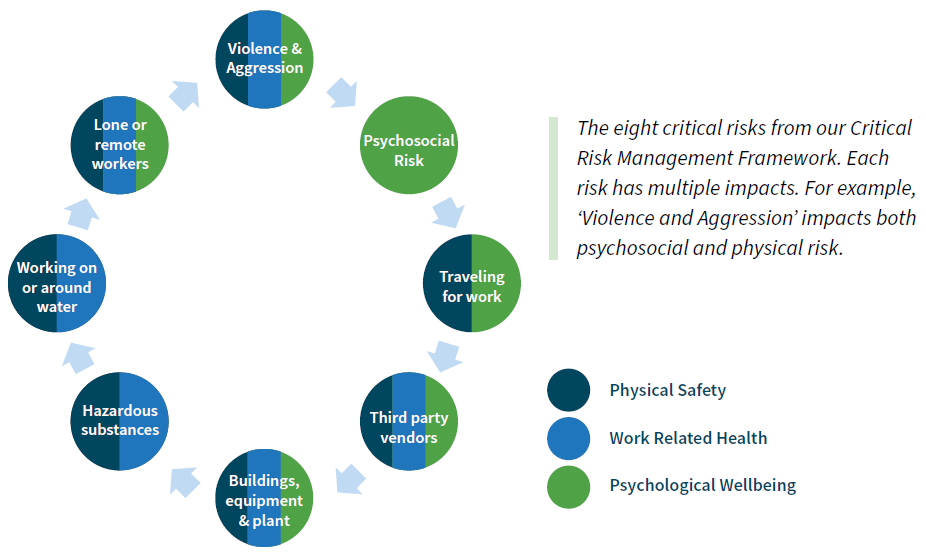
Ensuring our people have what they need to work effectively
Having the right technology ensures we deliver our services efficiently as technological tools and software help improve our processes and save time. We have continued to support kaimahi with reliable IT so they can collaborate and work effectively, wherever they are located.
As part of the Department’s focus on baseline reduction, we have made changes to reduce the costs of technology. At the same time, we are focused on maintaining and modernising our systems to ensure they remain stable and secure.
We are constantly improving systems to ensure they are quicker and easier for kaimahi to use. For example, we have made improvements to Rehutai, our Finance and HR system. We streamlined delegation and approval workflows to support budget holders and automated the setup of user access based on an employee’s position, which improved data entry accuracy. Improvements have also been made to reduce the time it takes to complete recruitment requests. Further changes have improved the way we load information into the payroll system, which saves time during pay cycles.
We have introduced new processes and controls for our leaders to reduce our use of contractors and consultants and therefore reduce costs.
Providing safe and secure workspaces for our people and the public
The Department has 17 locations nationwide and two overseas (Sydney and London). Our focus is on sites that are fit for purpose and where staff can effectively perform their work and that are safe for visitors and the public.
We view all property related projects through a sustainability lens and where possible we implement emissions reduction initiatives to minimise our environmental impact. Investing in better energy efficiency in our sites is not only good for the environment but also reduces operating costs in the long term.

The Property Capital Forward Works five-year deferred maintenance programme (2020–2025) continues to make progress across the Department’s owned property portfolio. During the year we:
- Upgraded CCTV cameras, installed bollards, rolled out new access cards, and provided training to improve security at our sites
- Continued the seismic uplift of our Archives building in Wellington and began assessing how to make the National Library building in Wellington more resilient to withstand earthquakes
- Began replacing the critical mechanical plant at the National Library in Wellington to mitigate risks to the collections
- Replaced emergency lights and upgraded to LED lighting at the Archives building in Whanganui.
We also reduced energy consumption, costs and our carbon footprint by:
- Replacing over 2,000 fluorescent lights with energy efficient LEDs and are gradually upgrading end-of-life equipment to more energy efficient and cost-effective options.
- Introduced Demand Control Ventilation to reduce energy consumption without impacting the health and safety of the buildings and our taonga.
Improving our tools, culture and practices for managing and protecting information
We are improving our content management system and moving it to SharePoint Online in 2024/25. This will deliver cost savings and kaimahi will find it easier to use, meaning they can perform their work faster.
We have a trusted role as the guardian of identity information, including passports, births, deaths and marriages, and citizenship information. We also collect other personal information to fulfil the wide range of functions we are responsible for. We take our obligations to keep people’s data secure seriously, so are continually improving our privacy practices and ensuring they are consistent across the Department.
All kaimahi complete annual Information Management and Privacy training.
Our kaimahi’s service recognised by the Public Service Commissioner’s Commendation:
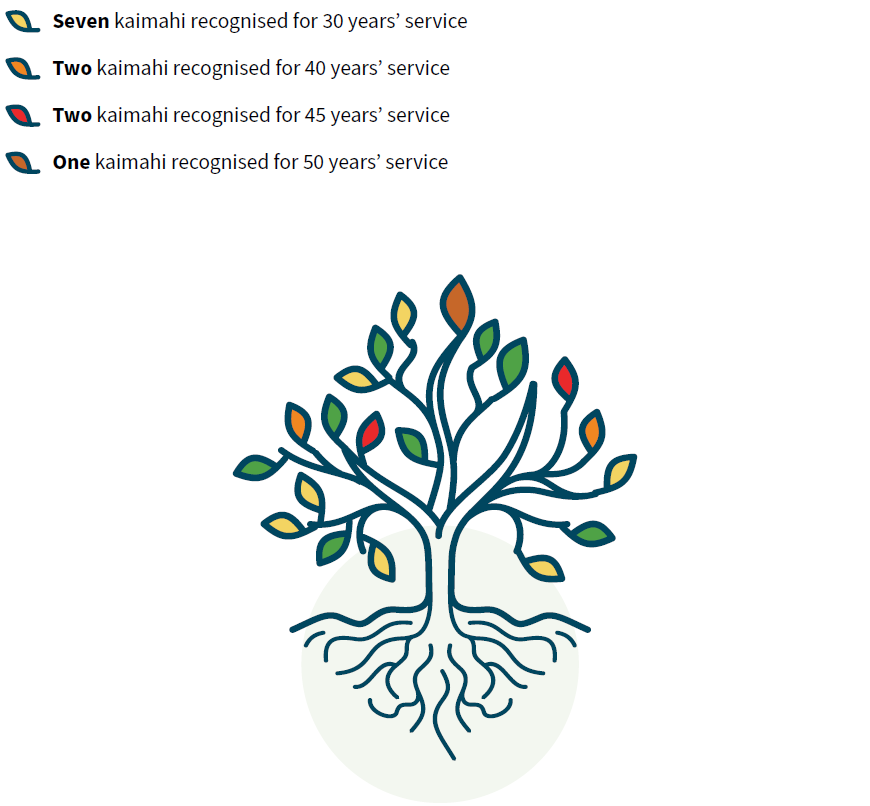
Diversity, equity and inclusion
Diversity, equity and inclusion in our workforce
Our aim is for our people to experience an inclusive workplace where they feel supported, connected, and empowered to be themselves and deliver what New Zealanders need.
We want a workforce that reflects the diversity of the communities we serve. Our permanent workforce includes 2,347 employees. Details of our workforce profile are contained in Appendix B.
Taura Herenga Waka, our Inclusion and Diversity strategy, is aligned with our principles (mātāpono) and reflects the five priority areas of Papa Pounamu– a comprehensive programme of work led by Te Kawa Mataaho Public Service Commission. We are committed to delivering and implementing this strategy alongside our Kia Toipoto – Closing Gender, Māori, Pacific, and Ethnic Pay Gaps Action Plan. By 15 November 2024, we will publish a Diversity and Inclusion plan on our website that captures our approach to inclusion and diversity and Kia Toipoto.
Addressing bias and discrimination
Some examples of how we take action to address bias and discrimination include:
- Creating awareness by celebrating cultural events, such as Matariki, Te Wiki o te Reo Māori and Pasifika Language Weeks, and taking part in activities such as Sweat With Pride, Pink Shirt Day and Sign Language Week
- Eliminating unconscious bias through online e-learning and resources for our leaders
- Delivering our ‘Above the Line, Below the Line’ workshops about managing unacceptable behaviour
- Maintaining an external Speak Up line to give kaimahi a confidential channel for discussing workplace concerns.
Strengthening cultural competence
We continue to strengthen cultural competence through a range of programmes:
- Mana Āki, our intercultural competence programme, helps build intercultural awareness and understanding
- The Mataora Programme, a marae-based initiative designed to enhance te ao Māori capability
- The Avei’a Pacific Leadership Programme, which focuses on creating a pathway for public sector leadership development, with the goal of increasing Pacific representation in tier 1 to 3 roles
- Te Aka Matua, our long-running Māori Leadership Programme ceased in 2023/24. Following a review, a new Māori Leadership Programme is under development as part of the Te Ao Māori pou of our He Waka Eke Noa strategy. The new programme is scheduled to launch in 2025.
We also have a range of courses and programmes aimed at lifting cultural capability in te reo Māori, waiata, tikanga and understanding of the Treaty of Waitangi/Te Tiriti o Waitangi.
In June 2024, we held regional Pasifika fono in Auckland and Wellington to bring our Pacific kaimahi together to discuss issues and challenges relating to their roles in the Department.
Supporting our employee-led networks
Kaimahi are encouraged and supported to participate in employee-led networks like the Tangata Whenua Network, Taha Moana Pacific Network, Women’s Network, DIAsians and Authentic Self (LGBTQ+). In 2023, the AND (Accessibility, Neurodiversity, Disability) Network was established.
We hold employee-led events throughout the year, and representatives from networks attend induction days to welcome new-starters to the Department. This ensures all kaimahi can connect to the networks that interest them at the beginning of their time with us.
Building inclusive leadership
Leaders play a critical role in creating a culture where kaimahi feel they can perform at their best.
In 2023/24, we developed a new Leadership Development Framework and programmes to support our leaders to improve their leadership skills, connect with other leaders, and be better equipped to lead our people.
The Leadership Framework covers what it takes to lead at the Department of Internal Affairs and puts leaders through training that develops the competencies outlined in the Framework, including inclusive leadership.
Providing equal employment opportunities for everyone
In 2023, we updated our Kia Toipoto Plan, which sets out how we will reduce gender and ethnic pay gaps. The gender pay gap was 7.3 percent on 30 June 2024.
Making our services accessible to all New Zealanders
We are committed to ensuring the work we do and services we provide are accessible by all New Zealanders in a way that meets their needs. Changes we have made to improve accessibility over the past year included the launch of an online accessibility learning module for staff. We also continue to improve the accessibility and plain language resources available to staff and provide training for staff to upskill in plain language.
Our asset performance
Managing our technology and property assets to support better outcomes
Technology assets
Our technology assets play a critical role in enabling kaimahi to work efficiently and ensure that the Department is a modern and responsive public service. Our ICT asset performance measures provide information on how our internal and customer-facing systems are performing. We monitor and report on the condition, use and functionality of our key assets.
This year we saw an increase in the average service time our ICT systems were available, reflecting an ongoing focus on service resilience. Our incident resolution timeframes measure how long it takes to resolve IT incident tickets. Our results declined this year, driven by a one-off event following a major upgrade of the passport system. We do not expect this to have an impact in future years. Of the changes made to IT systems during the year, 99.5 percent were made successfully, exceeding our target. We measure asset utilisation by the amount of workstation devices in service. Due to significant headcount changes driven by the closure of Water Services Reform, our utilisation decreased this year. We are working on process improvements to drive efficiency in this area.
Property assets
Our focus is on managing our property assets to ensure our buildings comply with legislative and health and safety regulations and provide an efficient environment for kaimahi to work and a safe place for visitors. We do this by setting and monitoring key asset performance indicators. Work deliver over the last year:
- We have completed seismic assessments for most of our properties. We have obtained NBS ratings for all the properties we own, and they are above the earthquake prone rating of 34 percent New Building Standard. This supports their resilience during earthquakes and other natural disasters.
- All our buildings have current building warrant of fitness certifications. This ensures compliance with fire safety regulations and the Building Act 2004.
- We have met the requirement for our office space use target of no more than 16 square metres per person.
- We continue to exceed optimal humidity and temperature targets in our Archive storage environments for the preservation of our taonga.
- We continuously improve the reliability and availability of our physical assets through regular monitoring and maintenance.
Asset condition performance for ICT and Property assets is detailed in Appendix C – Asset performance.
Our leadership and governance
The Executive Leadership Team of the Department of Internal Affairs includes the Secretary for Internal Affairs, seven Deputy Chief Executives and the Director of the Office of the Chief Executive. The Executive Leadership Team ensures the focus of our efforts and resources, and our operating model, supports our strategic governance role.

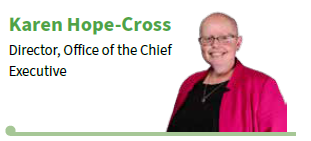
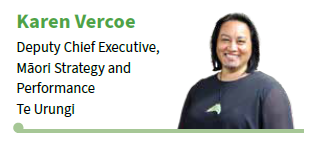
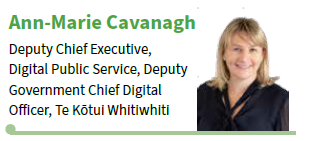
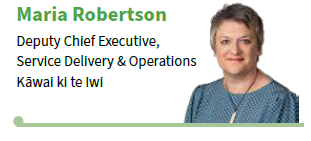
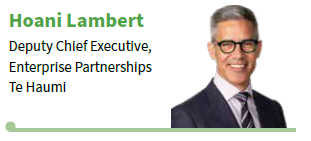
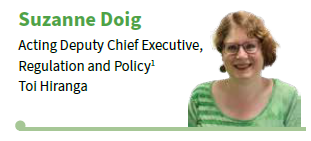
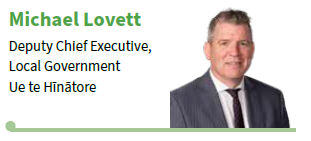
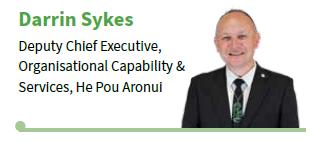
1. Marilyn Little was Deputy Chief Executive until February 2024.
Our governance
Our governance system ensures the Department delivers on its purpose, strategic priorities and focus on stewardship, through sound and sustainable long-term decision-making.
It is collectively led by the Executive Leadership Team and supported by three governance sub-committees with well-established governance principles and protocols. This includes clear and understood terms of reference and a comprehensive declaration of interest process.
Three governance committees support the Executive Leadership Team:
- Finance and Performance Governance Committee: provides direction, approval and assurance of the organisation’s strategy and delivery through oversight of its financial sustainability and organisational performance. This is achieved by regularly monitoring and reporting on the Department’s financial position, considering budget strategies and management of the integrated planning approach.
- Risk and Assurance Governance Committee: provides direction, approval and assurance on the effectiveness of the risk and assurance system, culture, and practice that serves to keep the business, people and their work safe. This is achieved by regularly monitoring internal and external assurance and audit reports and considering key organisational risk management systems and strategies.
- Investment Governance Committee: provides direction, approval and assurance of the health and performance of the Department’s portfolio management investment system. This is achieved by regularly reviewing project and programme business cases and investment decisions, and related performance matters.
The Department also has an External Advisory Committee that provides independent advice to the Secretary for Internal Affairs and the Executive Leadership Team in its management and governance responsibilities. This includes guidance on strategic direction, systems of governance, risk and assurance and organisational performance, as well as the integrity of performance information.
Risk and assurance
Effective risk and assurance systems and good practices are key components of effective governance. Good risk management practice helps to identify key risks to delivery and enables early intervention before risks impact on outcomes. Assurance supports governance bodies in their decision-making, provides evidence of how well business risks are being managed, whether opportunities are being taken, and how well the business is performing. Applying more consistent risk and assurance advice and support over priority and/or higher-risk projects and programmes is helping to further embed good risk management practices as integral to the Departments mahi, and ensure we focus on the right things. The Department’s Assurance Policy and Framework supports an integrated view of assurance.
Responding to the Government’s efficiency and effectiveness priority
In December 2023, the Minister of Finance announced an ongoing Fiscal Sustainability Programme to embed a culture of responsible spending across government. For Vote Internal Affairs, this meant identifying savings to deliver a permanent baseline reduction of 6.5 percent from the 2024/25 financial year.
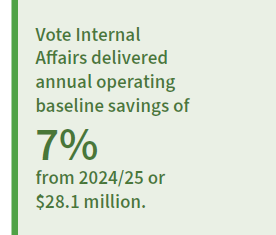
In early 2024 we were asked by Ministers and The Treasury to identify other possible savings options and Ministers decided to include these options in our baseline reduction. This meant Vote Internal Affairs delivered annual operating baseline savings of 7 percent from 2024/25 or $28.1 million. This includes $1.2 million from the Ministry for Ethnic Communities, which receives its funding from Vote Internal Affairs.
We identified a wide range of initiatives to meet the Government’s requirement. About 60 percent of savings involved changes to the services we deliver and how they are delivered. This included scaling back or stopping some services, finding operating efficiency savings, reviewing funding and investments, and being more efficient in the way that we deliver our work. The remaining 40 percent of savings impacted people and were managed through an organisational change process.
We will continue to operate in a tight fiscal environment for the foreseeable future. Our core responsibilities will continue to be delivered, but some programmes have been deferred or scaled back to fit within the reduced budget. Over the coming years, we expect a greater focus on restraint, reprioritisation, value-for-money, alignment to priorities, and efficiencies.
Go to the Contents View or download the PDF version Go to the next section